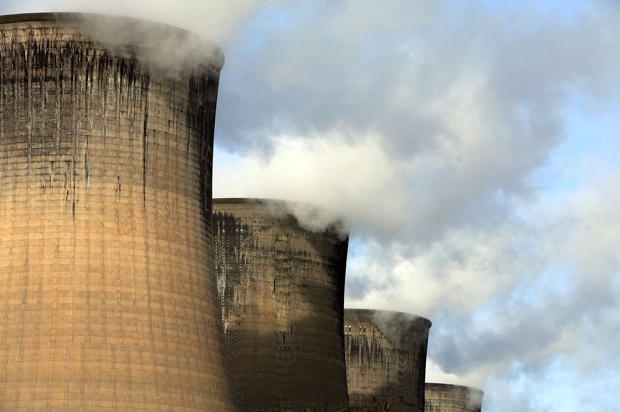‘Energy is the single biggest issue facing Jean-Claude Juncker,’ remarked a seasoned Eurocrat to me earlier this week. Europe’s energy infrastructure is decrepit and insular. Rates of cross-border interconnection, for example, remain very low – at just 8 per cent of their production capacity on average across the union according to the FT.
The Commission’s 2030 energy package aims to raise the average rate of interconnection to 15 per cent — part of a string of targets designed to complete the single market in energy. Alas, it’s going to take more than a target or two. The level of investment required is enormous (more than 1 trillion euros by the Commission’s estimate, of which only 5.8bn has been found for 2014-2020). The Commission has identified nearly 250 vital energy infrastructure projects, many of which lie in eastern and central Europe — where the network retains a Soviet flavour, with all the difficulties which that entails. According to the Visegrad Group (Poland, Hungary, Slovakia and Czech Republic):
‘Even though the Visegrad countries as a group are less dependent on overall energy imports than the EU average, from the perspective of security of energy supplies their import structure is actually quite unfavourable. This is because of the relatively high reliance on natural gas imports from Russia and typically (especially in the case of Slovakia, Hungary and Poland) via a single route and with very limited options of switching to alternative sources in case of supply disruption.’
Events in Russia and the Middle East over the last decade, and especially this year, have made plain Europe’s energy insecurity. The EU 2030 energy framework contains an explicit objective to increase the share of renewable energy to at least 27 per cent across the union by 2030. Renewable energy is, theoretically, internally sourced and would, therefore, reduce the continent’s reliance on dodgy sheikhs and tsars. But the renewable targets have been the subject of fierce disagreement between the 13 ‘green’ economies in western Europe and the Visegrad Group (plus Bulgaria and Romania), which are heavily dependent on fossil fuels (principally Polish coal, Romanian oil and gas and Gazprom).
To break the deadlock, the de facto leader of the Visegrad Group, the Polish premier Donald Tusk, proposed a European energy union earlier this year. His aims are: EU member states and institutions to negotiate collectively with Gazprom (rather than bilaterally), improve connectivity to enable the union to supply its own demand, and to diversify the supply of resource both internally and externally (Tusk is an advocate of European shale development and closer ties with energy producers in the Causasus).
The British government is understood to be supportive of Tusk (although it has reservations about the role that the Commission might play). British companies are already looking to exploit Poland’s potentially healthy shale deposits (the most promising in Europe according to the IEA). The completion of the single market has been a long-term aim of the British government; indeed, it is likely that Britain will push for this throughout the Juncker commission, which is why David Cameron is so keen to send a big-hitter to Brussels. Meanwhile, the French are also supportive of Tusk. The Elysee sees a chance for EDF to expand its nuclear operations into central and eastern Europe. There are also rumours in Whitehall — and among some players in the oil and gas exploration industry — that President Hollande might reverse his opposition to shale. In which case, Poland would be a useful ally.
Tusk has, however, found lukewarm support in Berlin, the seat of power in Europe at present. As ever, Angela Merkel has hedged her bets. She is broadly supportive of the Poles and of the Commission’s commitment to increase interconnectivity. It is understood that Merkel also sees sense in diversifying energy supply both within and without the union. The sticking point is Gazprom. As Liam Halligan reported in these pages some months ago, Mrs Merkel has fostered commercial ties with Russia. This relationship is epitomised by the Nord Stream – a set of pipelines, completed in 2012, which ships Gazprom’s gas to Germany while by-passing Poland.
Mr Tusk and his allies say that the Nord Stream marks Europe’s incoherence on energy policy. He argues that it harms the consumer, especially in eastern Europe. Gazprom, the Poles say, is not run by fools: it knows which of its European customers is in a weak position and charges accordingly. The Poles want to fight back by making the European energy market transparent and to use collective bargaining power under a centralised authority to drive down Gazprom’s prices. But the Commission (and, to be fair, some western European governments) fear that this may contravene existing internal market rules. Others worry that, unless supplies are significantly diversified, Gazprom will still hold the whip-hand; therefore, collective bargaining power would not be sufficient to reduce costs or improve security. Expect a long and hard fight in Brussels and Strasbourg to settle the question.
In this atmosphere where national interests openly compete across the union, a wheeler-dealer like Jean-Claude Juncker might not be a bad presence at the head of the Commission. Much, though, will depend on his commissioners. What is needed is robust free-marketeers with enough ‘bottom’ and personal charm to make progress in difficult circumstances. Of the likely British candidates (listed by James yesterday), Michael Howard fits the bill. He is, unquestionably, a free-marketeer with significant political clout. As for charm, Howard is infamous for having ‘something of the night’ about him; but, a former colleague from the Thatcher and Major years rubbishes that view: ‘Michael is a man of hidden depths. Just look at his wife.’






Comments